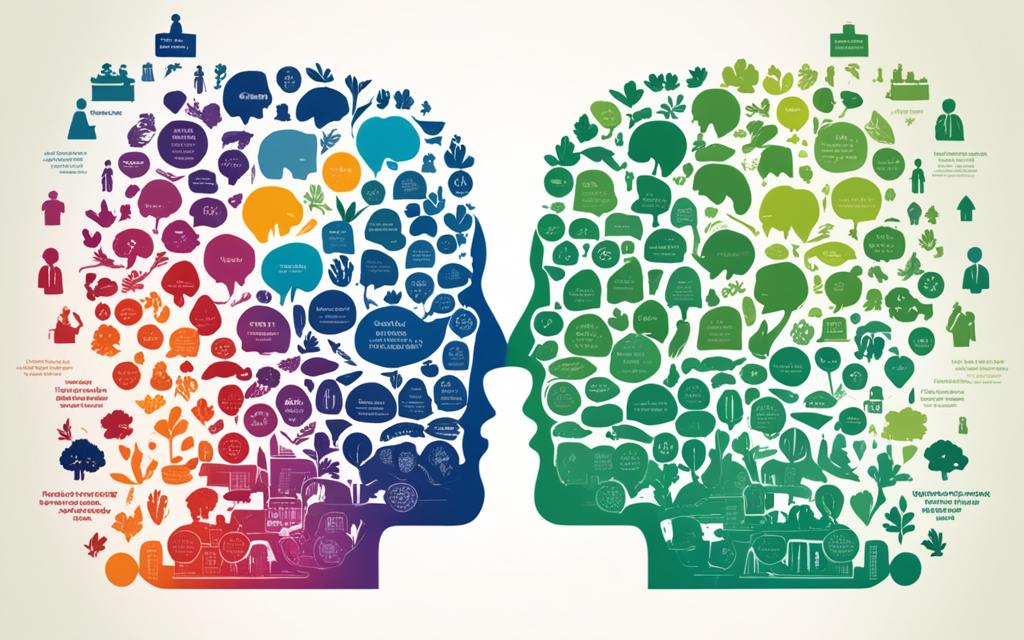In today’s society, mental health awareness and support have become crucial topics of conversation. While creating awareness is essential, it is equally important to go beyond mere awareness and provide tailored mental health support that meets the unique needs of individuals.
At a time when mental wellness resources are more accessible than ever, it is essential to explore the various options available. Online therapy has emerged as a convenient and effective solution for individuals seeking professional support from the comfort of their homes.
Mental health education plays a vital role in equipping individuals with the knowledge and tools they need to maintain their emotional well-being. By promoting mental health education, we empower individuals to understand the intricacies of mental health and seek appropriate support when needed.
Moreover, we must address the disparities that exist within mental health services. It is crucial to ensure that everyone, regardless of their background, has equal access to quality mental health support. By closing this gap, we can foster a society that values and prioritizes mental well-being.
In this journey towards holistic mental health, emotional well-being tools play a significant role. These tools empower individuals to actively participate in their mental wellness journey, promoting resilience and providing effective coping mechanisms.
By recognizing the importance of tailored mental health support, we can cultivate a society that prioritizes mental wellness, embraces diversity, and breaks down barriers to care. Together, let’s embark on this journey towards a better tomorrow.
Key Takeaways:
- Mental health support should go beyond awareness and be tailored to individual needs.
- Online therapy options provide convenient and effective mental health support.
- Mental health education is crucial in promoting understanding and seeking appropriate support.
- Addressing disparities in mental health services is essential for equitable care.
- Emotional well-being tools empower individuals in their mental wellness journey.
Embracing Cultural Competency in Mental Health Support
In order to provide effective and inclusive mental health support, it is essential to embrace cultural competency. Cultural competency refers to the ability to understand and respond to the unique needs and experiences of individuals from diverse cultural backgrounds. By recognizing and valuing cultural differences, mental health professionals can create a safe and supportive environment where individuals feel understood and respected.
Understanding the Impact of Diversity on Emotional Well-being
Diversity plays a significant role in shaping an individual’s emotional well-being. Cultural, ethnic, and religious backgrounds, as well as gender identity and sexual orientation, can all impact an individual’s mental health. To effectively support diverse populations, mental health professionals must have a deep understanding of how different factors can influence emotional well-being. This understanding allows for the provision of tailored and culturally sensitive care.
Strategies for Enhancing Therapist Cultural Awareness
Enhancing therapist cultural awareness is crucial for providing culturally competent mental health support. Here are some strategies that therapists can implement:
- Continuous education and training: Therapists should engage in ongoing education to expand their understanding of cultural diversity and its impact on mental health. This can include attending workshops, conferences, or cultural competency training programs.
- Self-reflection and examining biases: It is important for therapists to reflect on their own biases and beliefs to ensure they do not negatively impact their interactions with clients. Recognizing and challenging these biases allows therapists to provide unbiased and equitable care.
- Collaboration and consultation: Seeking input from colleagues and consulting with experts from diverse backgrounds can enhance therapists’ understanding of cultural nuances and help them create culturally sensitive treatment plans.
- Building trust and rapport: Developing strong therapeutic alliances with clients involves actively listening, showing empathy, and demonstrating a genuine interest in understanding their cultural perspectives and experiences.
By implementing these strategies, therapists can enhance their cultural awareness and create a therapeutic environment that respects and responds to the unique needs of individuals from diverse backgrounds.
Incorporating cultural competency into mental health support is an essential step towards providing effective care for diverse populations. By understanding the impact of diversity on emotional well-being and enhancing therapist cultural awareness, we can create a more inclusive and supportive mental health landscape.
Mental Health Advocacy and Breaking Down Barriers
In the journey towards better mental health, advocacy plays a crucial role in breaking down barriers and promoting access to appropriate support and resources. One of the key challenges that needs to be confronted is the stigma surrounding mental health, particularly in diverse communities. By addressing and reducing this stigma, we can create an environment where individuals feel safe to seek help and support.
Advocacy groups are at the forefront of mental health reform, working tirelessly to drive change and ensure that everyone has equal access to mental health services. These groups play a vital role in raising awareness, influencing policies, and advocating for the needs of diverse populations. Through their efforts, they contribute to shaping a society that prioritizes mental well-being for all.

| Advocacy Group | Focus |
|---|---|
| National Alliance on Mental Illness (NAMI) | Education, support, and advocacy for individuals and families affected by mental illness |
| Mental Health America (MHA) | Promoting mental health, preventing mental health conditions, and advocating for access to mental health care |
| The Trevor Project | Providing crisis intervention and suicide prevention services for LGBTQ+ youth |
| American Foundation for Suicide Prevention (AFSP) | Advocacy, research, and support for suicide prevention |
These advocacy groups collaborate with healthcare providers, policymakers, and community organizations to dismantle existing barriers and implement mental health reform initiatives. Their collective efforts aim to ensure that mental health services are universally accessible, culturally sensitive, and available to anyone who needs them.
By joining forces with advocacy groups, we can work towards a society that prioritizes mental health, reduces stigma, and fosters a supportive environment for all individuals.
The Rise of Online Therapy Options and Digital Support
In today’s digital age, the field of mental health services is rapidly evolving to meet the needs of individuals seeking support. With the rise of online therapy options and digital support, accessing mental health resources has become more convenient and accessible than ever before.
Online therapy options offer individuals the flexibility to receive therapy from the comfort of their own homes, eliminating the barriers of geographical location and transportation. This digital format allows individuals to connect with licensed therapists through secure video platforms, phone calls, or text-based messaging, providing a range of options to suit personal preferences and needs.
One of the key benefits of online therapy is its convenience. Digital support allows individuals to schedule therapy sessions that fit into their busy lives, eliminating the need to commute or take time off work. This flexibility is particularly beneficial for those with limited mobility, individuals living in remote areas, or individuals who prefer the anonymity and privacy that online therapy can provide.
Furthermore, online therapy options have seen increased popularity due to the COVID-19 pandemic. With social distancing measures in place, in-person therapy sessions have become challenging for many. Online therapy has emerged as a valuable alternative, ensuring continuity of care while prioritizing the safety and well-being of both therapists and clients.
It is important to note that while online therapy offers numerous advantages, there are also considerations to keep in mind. The lack of face-to-face interaction may impact the therapeutic relationship, and technical difficulties or internet connectivity issues can disrupt the session. Additionally, online therapy may not be suitable for individuals with severe mental health conditions or those who require immediate crisis intervention.
As technology continues to advance, so too does the potential for digital support in the field of mental health. Online therapy options and digital support platforms are constantly evolving to incorporate innovative tools and techniques, enhancing the overall therapeutic experience and expanding access to mental health services.
The availability of online therapy options and digital support in mental health services has revolutionized the way individuals seek and receive support for their mental well-being. With the benefits of convenience, accessibility, and a growing range of innovative approaches, remote therapy has become an integral component of mental health support in today’s digital age.
Tailoring Mental Health Education for Varied Populations
In order to promote effective mental health education, it is essential to tailor resources and approaches to meet the specific needs of diverse populations. Culturally sensitive and population-specific mental health resources play a crucial role in ensuring that individuals from all backgrounds have access to the support they need. By understanding and addressing the unique challenges and experiences faced by different communities, we can provide more inclusive and effective mental health education.
One important aspect of tailoring mental health education is recognizing the cultural factors that influence mental well-being. Different cultures may have varying beliefs, values, and attitudes towards mental health, and it is crucial to approach education in a way that respects and incorporates these perspectives. By incorporating cultural sensitivity into mental health education, we can create a more inclusive and relevant learning environment that resonates with diverse populations.
“Culturally sensitive and population-specific mental health resources play a crucial role in ensuring that individuals from all backgrounds have access to the support they need.”
Population-specific mental health resources can also address the unique needs and experiences of different groups. For example, mental health education programs targeted towards specific populations, such as youth, older adults, or LGBTQ+ communities, can provide tailored information and support that is relevant to their particular challenges and experiences. By recognizing and addressing these specific needs, we can ensure that mental health education is effective and meaningful for all individuals.
Overall, tailoring mental health education for varied populations is essential to promote inclusive and effective support. By incorporating cultural sensitivity and population-specific resources, we can ensure that individuals from all backgrounds have access to the knowledge and tools they need to prioritize their mental well-being. By investing in targeted and tailored mental health education, we can empower individuals to make informed choices about their mental health and foster a more mentally healthy society.
Identifying and Addressing Disparities in Mental Health Services
In order to ensure equitable mental health support for all individuals, it is crucial to address the disparities that exist in mental health services and accessibility. Underserved populations face unique challenges when it comes to accessing the care they need. By identifying and addressing these disparities, we can work towards a more inclusive and effective mental health system.
One of the main challenges faced by underserved populations is the lack of access to care. This can be due to various factors such as limited financial resources, geographic location, or a lack of culturally competent providers. Without access to mental health services, individuals in underserved populations may struggle to receive the support they need to maintain their well-being.
To address these disparities, it is essential to implement strategies that promote access to mental health services. This can include initiatives such as increasing the number of mental health providers in underserved areas, improving transportation options for individuals who need to travel long distances for care, and expanding telehealth services to reach remote communities. By removing barriers to access, we can ensure that everyone has the opportunity to receive the support they need.

Another important aspect of addressing disparities in mental health services is increasing awareness and understanding of the specific needs of underserved populations. This includes recognizing the impact of cultural, societal, and systemic factors on mental health outcomes. By acknowledging and addressing these factors, we can develop more tailored and effective approaches to mental health care.
Additionally, it is crucial to engage and involve community organizations and leaders in the process of addressing disparities in mental health services. These organizations play a vital role in advocating for the needs of underserved populations and can provide valuable insights and support. By collaborating with community partners, we can ensure that mental health services are responsive to the unique needs of different communities.
In conclusion, identifying and addressing disparities in mental health services is essential for promoting equitable access to care. By implementing strategies that increase access, address cultural and systemic factors, and involve community organizations, we can work towards a more inclusive and effective mental health system. It is the collective responsibility of individuals, organizations, and policymakers to ensure that mental health services are accessible to all, regardless of their background or circumstance.
Mental Health Awareness and Support
In today’s society, mental health awareness and support have become increasingly important. There is a growing recognition of the impact that mental health has on individuals’ overall well-being. To ensure access to adequate resources and support, it is crucial to expand these services through partnerships and technology.
Expanding Access Through Partnerships and Technology
Partnerships between mental health organizations, healthcare providers, and community institutions can greatly enhance the reach and impact of mental health support. By joining forces, these entities can pool their resources and expertise to provide comprehensive care for individuals in need. This collaborative approach can lead to more tailored and effective support systems.
Furthermore, technology plays a vital role in expanding access to mental health resources. With the increasing use of digital platforms, individuals can easily access information, education, and support at their convenience. Online therapy options, mental health apps, and telehealth services have revolutionized the way mental health support is delivered, breaking down barriers such as location and transportation.
Integration of Mental Health Helplines and Crisis Prevention
Mental health helplines and crisis prevention services provide immediate support to individuals facing mental health challenges or crises. By integrating these services into various platforms and technologies, individuals can receive prompt assistance and guidance when needed most.
With the advancement of technology, mental health helplines have become more accessible. Through phone, chat, or text-based services, individuals can connect with trained professionals who can provide guidance, support, and referrals to appropriate resources. These helplines play a crucial role in crisis prevention and offer a lifeline to those in distress.
By integrating mental health helplines and crisis prevention services into digital platforms and technologies, individuals can easily access these resources anytime, anywhere. Whether through dedicated apps, websites, or social media channels, individuals can find the support they need, breaking down barriers and ensuring immediate assistance.
In conclusion, expanding access to mental health support is essential in promoting overall well-being. Through partnerships and technological advancements, we can bridge gaps, reach underserved populations, and provide tailored support to diverse individuals. By integrating mental health helplines and crisis prevention services into digital platforms, we can ensure immediate assistance and support during times of need. Together, these efforts contribute to a society that promotes mental health awareness and provides the necessary support to individuals on their mental health journey.
Tools and Resources for Emotional Well-being
In order to support emotional well-being, it is important to have a range of tools and resources at your disposal. These resources can provide valuable support and guidance in navigating the challenges that life may present.
Creating an arsenal of emotional well-being tools allows individuals to develop strategies and interventions that work best for them. These tools can vary from person to person, as everyone has unique needs and preferences. By exploring different approaches, individuals can find what resonates with them and helps promote their own mental wellness.
Mental wellness resources play a crucial role in building resilience and managing life’s ups and downs. These resources can include online platforms, self-help books, mobile applications, and support groups. They provide valuable information, techniques, and support networks that can empower individuals to navigate difficult times and foster their emotional well-being.
It is important to note that mental health support is not limited to traditional therapy sessions. While therapy is a valuable resource, there are many other tools and resources available that can complement and support mental health care. These resources can be accessed at any time and can be tailored to suit individual needs and preferences.

Having a diverse range of emotional well-being tools and mental wellness resources allows individuals to take an active role in their own mental health. It empowers them to develop coping skills, build resilience, and thrive in their daily lives.
Incorporating Intersectionality in Mental Health Care
In providing effective mental health care, it is essential to recognize the significance of intersectionality. Intersectionality refers to the unique experiences and challenges that individuals face when multiple aspects of their identity intersect, such as race, gender, sexuality, disability, and socioeconomic status. Understanding how these diverse identities intersect and impact mental health is crucial for providing inclusive support that addresses the specific needs of marginalized individuals.
By incorporating intersectionality in mental health care, we can ensure that individuals receive the appropriate resources and interventions that consider their intersecting identities. This approach goes beyond a one-size-fits-all model and recognizes the nuances and complexities of individual experiences.
By embracing intersectionality, mental health professionals can:
- Recognize and acknowledge the unique challenges faced by individuals with multiple marginalized identities.
- Create a safe and inclusive therapeutic environment that validates and respects diverse experiences.
- Provide culturally sensitive and relevant interventions that address the interconnected nature of various identities.
- Collaborate with other professionals, including those from different disciplines, to ensure holistic and comprehensive care.
Furthermore, intersectionality highlights the importance of addressing systemic barriers and advocating for structural changes that promote equity in mental health care. By elevating the voices of individuals with intersecting identities and advocating for inclusive policies, we can work towards a mental health care system that is accessible and affirming for all.
“Incorporating intersectionality in mental health care is crucial for ensuring that individuals with diverse identities receive the support and resources they need. By recognizing how different aspects of identity intersect and influence mental health, we can provide inclusive and tailored care that addresses the unique challenges and experiences of each individual.” – Dr. Jane Thompson, Clinical Psychologist
In conclusion, incorporating intersectionality in mental health care is essential for promoting equitable and effective support. By acknowledging the diverse identities and experiences that individuals navigate, mental health professionals can provide inclusive care that meets the specific needs of marginalized populations.
Strengthening Community Support Systems for Mental Wellness
In order to promote mental well-being, it is crucial to strengthen community support systems. These systems play a pivotal role in ensuring that individuals have access to the resources and support they need to maintain good mental health. One of the key components of community support systems is peer support, which provides individuals with the opportunity to connect with others who have similar experiences and challenges.
Facilitating Peer Support and Group Healing Spaces
Peer support can take various forms, including support groups, online communities, and mentorship programs. These platforms create safe and non-judgmental spaces for individuals to share their stories, seek advice, and find solace in the experiences of others. For many people, peer support is a vital source of validation, encouragement, and empathy.
Group healing spaces also play a significant role in community support systems. These spaces provide a collective and supportive environment where individuals can engage in therapeutic activities, share their emotions, and heal together. Group healing spaces can take the form of art therapy workshops, meditation circles, or community-led initiatives that promote mental well-being.
Leveraging the Power of Mental Health Advocacy Groups
In addition to peer support and group healing spaces, mental health advocacy groups are instrumental in strengthening community support systems. These groups actively mobilize resources, raise awareness, and advocate for improved mental health services and policies. By amplifying the voices of individuals with lived experiences and collaborating with community stakeholders, mental health advocacy groups drive positive change and ensure that mental wellness remains a priority in society.
By focusing on peer support, group healing spaces, and the power of mental health advocacy groups, we can create a strong and inclusive community support system that fosters mental wellness for everyone.
Nurturing a Generation: Focused Support for Youth and Adolescents
In the realm of mental health, providing focused support for youth and adolescents is of paramount importance. The unique challenges and vulnerabilities faced by young people necessitate early intervention and targeted resources to promote their well-being. By addressing the specific mental health needs of this demographic, we can empower them to navigate their emotions, build resilience, and thrive in their daily lives.
Adolescence is a critical period of physical, emotional, and cognitive development. It is also a time when mental health disorders can emerge or worsen, impacting educational attainment, relationships, and overall quality of life. According to recent studies, approximately 1 in 6 youths experience a mental health disorder, underscoring the urgency of providing support tailored to their needs.
Early intervention plays a vital role in mitigating the negative impact of mental health challenges on young individuals. By identifying and addressing mental health issues at an early stage, we can prevent their progression and equip young people with the necessary tools to manage their mental well-being. Early intervention focuses on prompt identification, assessment, and targeted interventions to support youth in their journey towards mental wellness.
In addition to early intervention, it is crucial to implement targeted resources that cater specifically to the unique needs and circumstances of young individuals. These resources can include psychoeducation on mental health, coping strategies, and effective communication skills. By equipping young people with knowledge and skills related to their mental well-being, we empower them to make informed decisions, seek support when needed, and develop healthy habits for lifelong mental wellness.
Support networks also play a significant role in nurturing the mental health of youth and adolescents. Engaging parents, caregivers, schools, and communities in the mental health support process helps create a holistic and supportive environment for young individuals. Collaborative efforts involving these stakeholders can enhance awareness, destigmatize mental health challenges, and foster a culture of empathy and support.
To illustrate the significance of focused support for youth and adolescents in managing their mental health, let us explore a hypothetical case study:
Case Study: Sarah, a 16-year-old high school student, has been experiencing symptoms of anxiety and depression. Recognizing her distress, her school counselor provides immediate support by connecting her with a mental health professional who specializes in adolescent mental health. Through targeted therapy sessions, Sarah learns coping mechanisms and receives guidance on stress management. The therapist also collaborates with Sarah’s teachers and parents to ensure consistent support across all areas of her life. Through this comprehensive approach, Sarah’s mental health gradually improves, and she develops the skills necessary to navigate future challenges confidently.
The table below showcases some key elements of focused support for youth and adolescents:
| Key Elements of Focused Support for Youth and Adolescents | Benefits |
|---|---|
| Early intervention | – Prevents worsening of mental health issues – Equips individuals with tools for managing mental well-being |
| Targeted resources | – Address unique needs of youth and adolescents – Empower individuals with knowledge and skills for mental well-being |
| Engaging support networks | – Creates a supportive environment – Enhances awareness and destigmatization of mental health challenges |
By providing focused support for youth and adolescents, we prioritize their mental well-being and set the stage for a healthier and more resilient future generation. It is incumbent upon us as a society to invest in targeted resources, implement early intervention strategies, and foster a culture that values and supports the mental health of young individuals.
Mitigating Mental Health Crisis: Immediate Support and Long-term Strategies
In times of mental health crisis, it is crucial to provide both immediate support and implement long-term strategies to effectively address and manage the situation. Crisis support services and emergency mental health interventions play a vital role in providing immediate assistance to individuals in distress. These services are designed to offer support, guidance, and resources to those experiencing a mental health crisis. They help ensure that individuals receive the necessary help and care during their time of need to prevent escalation and promote recovery.
“During a mental health crisis, it is essential to reach out for help and utilize available crisis support services. These services are designed to provide immediate assistance and help individuals navigate through distressing situations, whether it’s through helplines, crisis centers, or emergency mental health services.” – Emily Johnson, Mental Health Advocate
Emergency mental health services, such as mobile crisis teams and psychiatric emergency departments, offer specialized care in urgent situations. These services provide immediate assessment, stabilization, and intervention to individuals in crisis. They ensure that individuals receive appropriate treatment and support, preventing the situation from further worsening.
However, it is equally important to implement long-term strategies to prevent and manage mental health crises effectively. Long-term strategies focus on addressing the underlying causes and risk factors associated with mental health crises. These strategies may include:
- Increased access to mental health services and resources
- Mental health education and awareness campaigns
- Early intervention programs
- Supportive and inclusive communities
- Cultivating emotional resilience and coping skills
- Reducing stigma surrounding mental health
- Collaboration between healthcare providers, policymakers, and community organizations
By implementing these long-term strategies, we can create a supportive environment that promotes mental well-being and prevents crises from occurring. It is essential to prioritize mental health and create a comprehensive system that addresses the needs of individuals at every stage of their mental health journey.
| Immediate Support | Long-term Strategies |
|---|---|
| Provides immediate assistance | Addresses underlying causes |
| Prevents escalation of crises | Reduces the risk of future crises |
| Offers guidance and resources | Promotes mental well-being |
Conclusion
The Way Forward in Mental Health Advocacy
As we conclude our exploration of mental health advocacy and support, it becomes clear that there is still much work to be done. By reflecting on the key takeaways from this article, we can identify the path towards a society that values integral mental health awareness and support for all individuals.
Cultivating a Society of Integral Mental Health Awareness and Support
First and foremost, mental health advocacy needs to be a priority at all levels, from individual communities to national policies. This requires a collective effort to destigmatize mental health and promote open conversations around emotional well-being. By integrating mental health education into schools and workplaces, we can ensure that future generations are equipped with the knowledge and skills to navigate their mental health.
Furthermore, the way forward involves addressing the disparities and barriers that exist within our current mental health systems. It is crucial to recognize and minimize the impact of cultural, socioeconomic, and intersectional factors on mental well-being. This includes prioritizing the development and provision of population-specific resources and services that cater to the unique needs of diverse communities.
Lastly, we must leverage technology and partnerships to increase access to mental health support. Online therapy options and mental health helplines have emerged as valuable resources, especially in times of crisis. By expanding these services and ensuring they are integrated into existing healthcare systems, we can bridge the gaps in mental health care and reach individuals who may otherwise struggle to access support.
In conclusion, by prioritizing mental health advocacy, fostering integral mental health awareness, and enhancing support for mental well-being, we can create a society that values and supports the emotional well-being of all individuals. It is a collective responsibility to drive change and build a future where mental health is not only acknowledged but actively embraced.
FAQ
What is the importance of providing tailored mental health support beyond basic awareness?
How can online therapy options contribute to mental health support?
Why is mental health education important for different populations?
How can we address the disparities that exist in mental health services?
What are the benefits of online therapy options and digital support for mental health?
How does cultural competency play a role in mental health support?
What is the role of mental health advocacy in reducing stigma and breaking down barriers to care?
How can we strengthen community support systems for mental wellness?
What resources are available to support emotional well-being?
Why is it important to incorporate intersectionality in mental health care?
How can we provide focused support for youth and adolescents in managing their mental health?
What are the strategies for mitigating mental health crises?
Source Links
- https://www.konaaz.com/blog/beyond-awareness-fostering-inclusivity-and-cultural-competency-in-mental-health-for-black-history-month-and-beyond
- https://blog.google/technology/health/mental-health-awareness-month-2023/
- https://execsintheknow.com/blog/namis-morethanenough-campaign-amplifying-mental-health-awareness-month/



